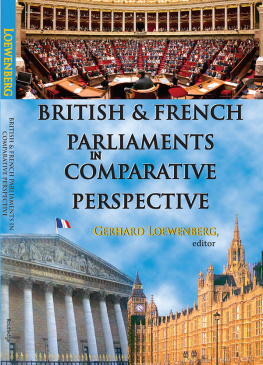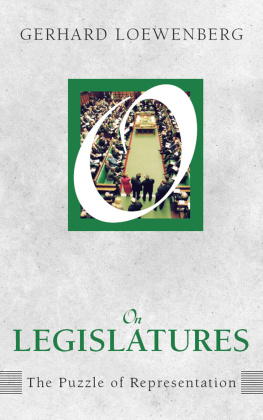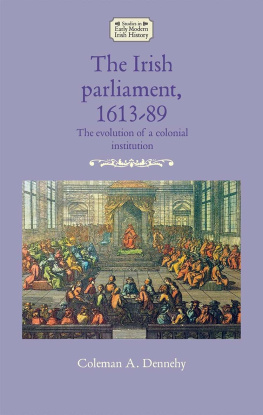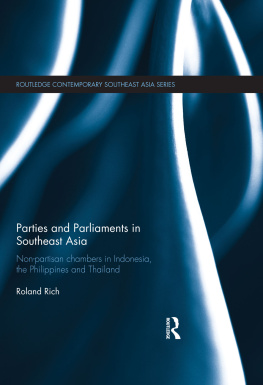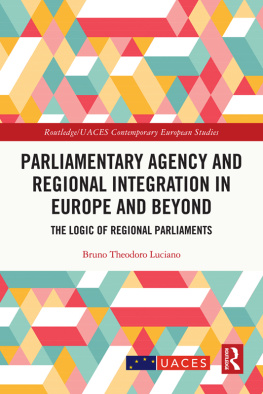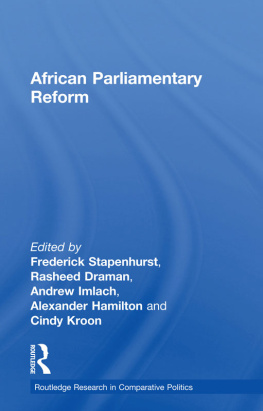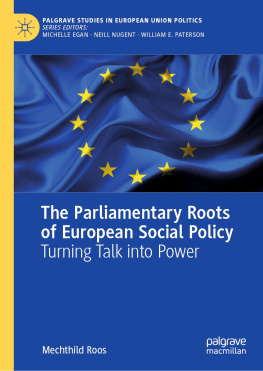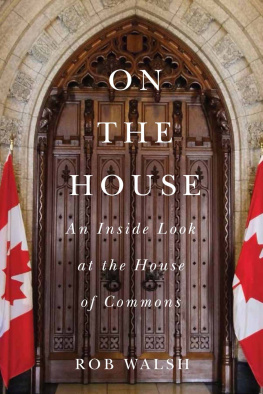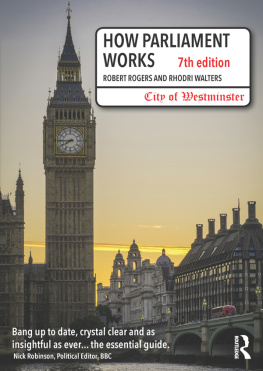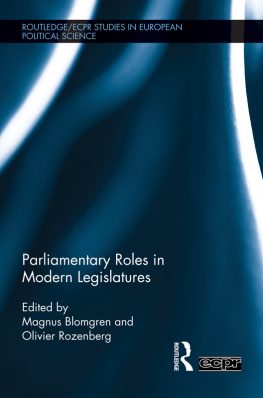First published 1971 by Transaction Publishers
Published 2017 by Routledge
2 Park Square, Milton Park, Abingdon, Oxon OX14 4RN
711 Third Avenue, New York, NY 10017, USA
Routledge is an imprint of the Taylor & Francis Group, an informa business
All rights reserved. No part of this book may be reprinted or reproduced or utilised in any form or by any electronic, mechanical, or other means, now known or hereafter invented, including photocopying and recording, or in any information storage or retrieval system, without permission in writing from the publishers.
Notice:
Product or corporate names may be trademarks or registered trademarks, and are used only for identification and explanation without intent to infringe.
Library of Congress Catalog Number: 2010005826
Library of Congress Cataloging-in-Publication Data
British and French parliaments in comparative perspective / Gerhard Loewenberg, editor,
p. cm.
Originally published: Modern parliaments. Chicago : AldineAtherton, c [1971]
Includes bibliographical references and index.
ISBN 978-0-202-36360-8
1. Representative government and representationCase studies.
2. Legislative bodiesCase studies. 3. Great Britain. Parliament.
4. France. Parlement (1946-) I. Loewenberg, Gerhard.
JF511.B75 2010
328.41-dc22
2010005826
ISBN 13: 978-0-202-36360-8 (pbk)
Loewenberg Gerhard
The representative assembly, or parliament, as it is most widely called, is at once an old, a ubiquitous, and a controversial political institution. In this century it has attracted the criticism of both disillusioned democrats and true believers in the superior representatives of mass movements or of charismatic leaders. Even among its supporters the institution is incessantly the object of reform.
This volume brings together the views of European and American scholars who share a concern for the vitality of parliament but who differ on what it should be doing and how its performance should be assessed. Writing from the perspective of different national experiences, they display the varied perceptions and expectations of the institution which sustain it even while they make it controversial.
Most of the essays in this volume have not been readily available previously, or have not existed in English. I am grateful to their authors for permission to present them in this context.
I Modern Parliaments
Loewenberg Gerhard
GERHARD LOEWENBERG
Parliament is a paradoxical institution. Medieval in origin, it exists in nearly all contemporary political systems. Although associated with democracy, it has also had its place in aristocracies and dictatorships. Regarded as an ideal instrument of representation, it has at times been composed of instructed as well as autonomous members, who have been variously chosen by birth or appointment as well as by election. The name of the institution derives from parler, to talk, yet lawmaking is commonly assumed to be its chief function and talking its main weakness. Although recent research indicates that most parliaments have limited importance in the policy-making process of modern government, few polities, from neighborhood associations to supranational organizations, from long-established to newly independent states, are without this institution. In view of the variety of forms which parliament has taken, the contrasting cultures in which it has appeared, and the tenacity with which it has confounded the prophets of its demise, few generalizations about the institution seem safe.
The very adaptability of parliament makes it a controversial institution. Every stage of its development has attracted criticism from the opponents of change. When the British middle classes used parliament in the seventeenth century to control government policy and expenditure on behalf of their own interests, royalists complained that parliament had exceeded its traditional constitutional role. When representatives of newly enfranchised groups entered European parliaments in the nineteenth century, the established ruling classes regretted the passing of the golden age of the independent member. When complex twentieth-century political issues appeared on the agendas of parliaments, and the burden of work moved to specialized committees, observers criticized the declining frequency and quality of great debates on the floor of the House.
The controversies that the institution has attracted through its long history persist to this day. In Great Britain there is a lively dispute over the propriety of specialization among parliamentary committees, in France the constitutional power of parliament in relation to the other institutions of government is unsettled, in Germany there is controversy over the priority which parliament should give to debate on public issues, and in India there is question about the relevance of this medieval European institution to the problems of nation-building in the non-Western world. A self-styled extraparliamentary opposition in Western Europe asserts the basic incompatibility of traditional representative assemblies with democracy. Research on legislatures appears to support the view that the institution performs few policy-making functions, but research orientations are themselves controversial.
The essays in this volume give evidence of these contemporary controversies, and they suggest the variety of roles that parliaments are expected to play in modern political systems. They also indicate the widespread existence of the institution, the vastly different forms it takes, and some of the reasons for its remarkable durability.
What Is a Parliament?
The structure has variously been called parliament, congress, legislature, diet, chamber of deputies, representative assembly, and numerous other terms. No wonder its common features seem elusive. Can even the broadest definition of parliament embrace both a city council of five members and a national assembly of five hundred? An elected chamber like the United States Congress and one in which membership is largely determined by birth, like the British House of Lords? The representative assemblies of predemocratic political systems as well as the democratic chambers in Western Europe and North America today? The Soviets of the USSR as well as the elected houses established in newly independent states? As a matter of fact, all these manifestations of parliament do share at least two identifying structural characteristics, derived from the common ancestry of the institution in medieval Europe: (1) their members are formally equal to one another in status, distinguishing parliaments from hierarchically ordered organizations; and (2) the authority of their members depends on their claim to representing the rest of the community, in some sense of that protean concept, representation.
Certain aspects of the organization and composition of parliaments result from these two structural characteristics. Because of the equality of their status, members of parliament are reluctant to employ sanctions against one another. Parliamentary rules of procedure therefore depend to an extraordinary degree on the implicit folkways of the group, to some extent ponderously registered as precedents, to some extent merely sanctioned by custom and habit. Equality of status also determines that members of parliament work collectively, either in meetings of the entire membership or of committees of members. And concepts of representation affect the composition of parliaments and the roles which their members play.

